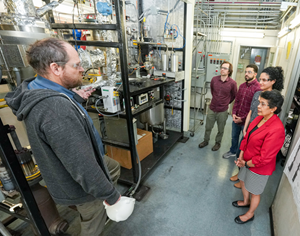News
NETL researchers achieve unprecedented experimental scale-up of catalyst for H2 production
NETL researchers recently scaled up H2 production tests by increasing the catalyst load from 500 grams to 4.5 kilograms, a significant step toward advancing the H2 production technology needed for a clean energy future.
The patented NETL catalyst helps to enable a process called catalytic methane pyrolysis (CMP), which breaks down methane into H2 and solid carbon without creating carbon dioxide emissions. This and other clean methods of H2 production will be critical for the growth of the future H2 economy supported by the U.S. Department of Energy (DOE).
DOE is seeking to reduce the cost of clean H2 by 80% to one dollar per one kilogram in one decade via its H2 Shot initiative. Such a reduction could unlock new markets for H2, including steel manufacturing, clean ammonia, energy storage and heavy-duty trucks. This would create more clean energy jobs, reduce greenhouse gas emissions and position America to compete in the clean energy market on a global scale.
“We achieved greater than 80% methane-to-H2 conversion for 30 hours in the test,” said NETL’s Ranjani Siriwardane. “And this was after using 10 times more catalyst than in the previous test, which shows that the material can be scaled up and work at the sub-pilot scale.”
The NETL catalyst outperformed other catalysts reported in the literature, and the scale of the test is also unprecedented. The CMP process provides several technical advantages over processes using other catalysts, including using a more effective and lower-cost catalyst. Additionally, CMP is a one-step process to produce both H2, which is a clean-burning fuel, and high-value solid carbon products such as graphitic nano carbons and nano fibers, which can be used to create many high-tech and clean energy technologies and help offset H2 production costs.
“Developing a suitable catalyst for methane pyrolysis has been a barrier issue in this research,” Siriwardane said. “But, by leveraging the world-class facilities and talented staff at NETL, we’ve solved the problems facing other catalysts such as poor conversion, high-cost and separation issues. We have a catalyst with a high conversion rate, low cost and continuous H2 production with effective carbon separation that was tested at a significant scale for production.”


